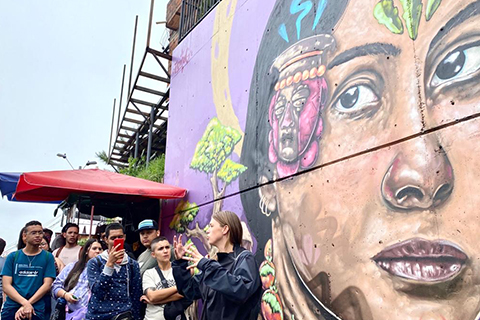Peacebuilding in Colombia: There is a Future if There is Truth
HU’s Leslie Wingender reflects on the work of the Colombian Truth Commission since the signing of the peace agreement in 2016.
HU’s Leslie Wingender reflects on the work of the Colombian Truth Commission since the signing of the peace agreement in 2016.

This is the first in a series of blogs on peacebuilding in Colombia. View the full series here.
After more than 50 years of violent conflict and four years of negotiations, a peace agreement was signed in August 2016 between the Colombian government and the Revolutionary Armed Forces of Colombia (FARC).

In their transition from armed conflict, both parties designed and agreed upon Colombia’s transitional justice system – the Comprehensive System of Truth, Justice, Reparation, and Non-Repetition.
This summer I had the opportunity to join several other HU colleagues at the Truth Commission’s final event in Colombia where Padre Francisco de Roux, head of the Truth Commission, officially delivered the final report. The report was titled “Hay Futuro si Hay Verdad,” which in English means “there is a future if there is truth.”
The question that Padre de Roux asked while presenting the final report hits at the core of Colombian experience: “How could we as a society have lived with this for so long? How did we let this happen?”
Forging a Pathway to Peace
Colombia’s transitional justice system is a collaboration between the Special Jurisdiction for Peace (JEP); the Unit to Search for People Disappeared (UBPD); and the Commission for the Clarification of the Truth, Peaceful Coexistence, and Non-Repetition (CEV).
The CEV was created to listen, clarify and attest to the truth of what happened in the context of the armed conflict across 50 years of war. John Paul Lederach, an advisor to the commission and global peacebuilding expert and scholar, describes the innovative and holistic nature of the CEV in this way: “The Truth Commission works with civil society, community, and the government to shed light on what happened during the armed conflict to ensure violence is not repeated, and to foster coexistence among communities.”
Critical to its mandate was the creation of platforms that acknowledge victims and promote social healing and non-repetition of armed conflict. The CEV opened 28 “Casas de la Verdad,” or Truth Houses, as a strategy to build trust with communities. These houses were safe spaces for communities to contribute to the clarification of the armed conflict, find explanations from those responsible, and weave processes of coexistence. This work was done in person through the Truth Houses as well as digitally through audio and visual recordings. The CEV continued its work throughout the pandemic and various levels of lockdown through audiovisuals and online engagement with communities, culminating in the first online, public report of its kind. The report includes insight into methodologies and processes, as well as videos and art that communities created to accompany the work.
Voices Heard, Lessons Learned
I’ve always been intrigued by truth commissions such as those in South Africa, Peru, Guatemala, Kenya, and many other places. One thing is very clear: The pursuit of justice, truth, and reconciliation in the face of terrible suffering is an incredible and strenuous process.
In Colombia, that process took seriously the gaps, challenges, and learnings from previous experiences around the world. The amount of audio, video, and artistic pieces created as part of this process by individuals and communities to grapple with and share their truth is astounding. All of these pieces can be accessed through the Truth Commission’s TransMedia platform.
“We have enormous social capital that was created in this process and it is not just the report; other countries did not have this opportunity, but we have it and are handing it over. This social capital leads to social movement and to conversations for the next 10 years,” said Lucia Gonzalez, a member of the Truth Commission.
Whether we grew up in Colombia or elsewhere, it is absolutely imperative to not stop in the pursuit of peace now, but to leverage this moment to shift towards transformation.
“How could we as a society have lived with this for so long? How did we let this happen?”
I lived in Colombia until I was 18, and being able to grapple both professionally and personally with this question has been one of the highlights of my career. I am committed to continue walking alongside those in Colombia who are seeking truth and choosing to live in new, more peaceful ways with others.
Leslie Wingender is a Director for Peacebuilding at Humanity United. She leads HU’s work in Colombia.